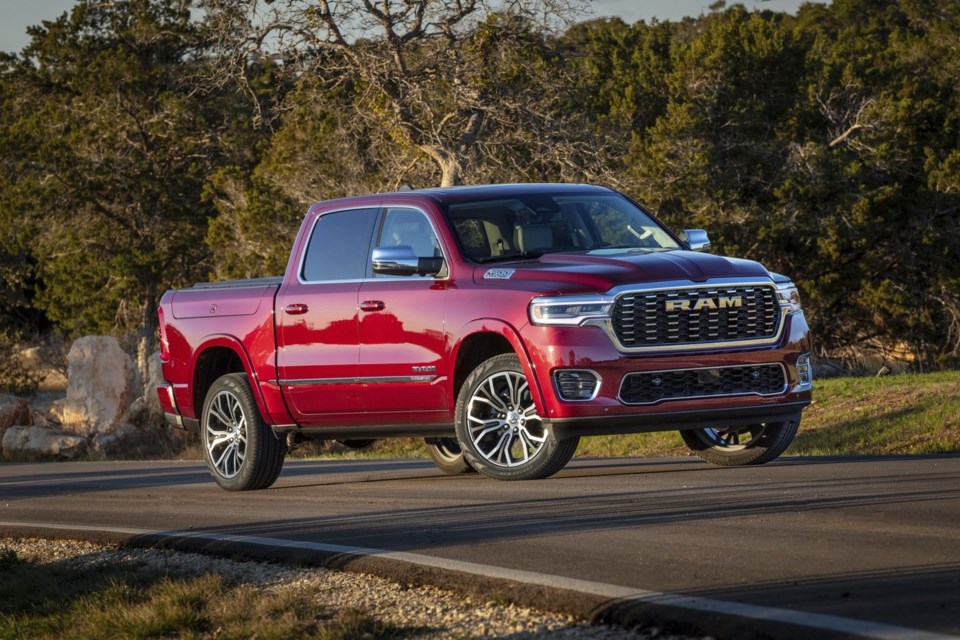The Ford F-150 has consistently been a top-rated truck at Edmunds. Thanks to the many available engines and configurations, the F-150 can be anything from a basic work truck to a leather-lined luxury machine that’s capable of trailering sizable campers and boats. Ford has also updated the 2024 F-150 with fresh styling and new technology features.
But its success doesn’t mean the F-150 has the full-size truck market all to itself. The Ram 1500 is another Edmunds favorite. Known for its smooth ride and outstanding cabin quality, the 2025 Ram 1500 presents an equally impressive résumé for truck shoppers who want a do-it-all truck. This year’s truck also receives two new powerful turbocharged engines.
Which full-size light-duty truck is the better buy? Edmunds’ test team experts compare the F-150 and Ram 1500 to find out.
Engines and MPG
The F-150 offers six engine choices for its expansive lineup. They are a trio of turbocharged V6s; a naturally aspirated V8; a V6-based hybrid version; and a thunderous 720-horsepower supercharged V8 reserved for the off-roading Raptor R.
The hybrid powertrain is perhaps the most compelling. It makes a strong 430 horsepower and also delivers the best fuel economy. The EPA estimates the hybrid can get up to 23 mpg in city/highway combined driving.
Most notable for the 2025 Ram 1500 is Ram’s decision to discontinue the truck’s V8 engine in favor of a turbocharged six-cylinder engine. The standard variant produces 420 horsepower, while the high-output engine churns out a thumping 540 horsepower. The best fuel economy you can get with one of these engines is 23 mpg combined.
During testing, Edmunds found the Ram is quicker. A Ram 1500 fitted with the high-output version needed just 4.7 seconds to sprint to 60 mph compared to the F-150 hybrid’s 5.9 seconds. That’s a compelling case for the Ram, though the F-150 counterpunches with its better mpg and broader engine lineup.
Winner: tie
Towing and Payload
This pickup dogfight also takes into consideration maximum towing and payload capacities. The F-150 has a clear lead with its maximum tow rating of 13,500 pounds and max payload 2,445 pounds. Both maximums are with the 400-horsepower version of the truck’s turbocharged V6.
No one would accuse the Ram 1500 of being a pushover, however. When properly equipped it can tow 11,550 pounds and haul 2,370 pounds. The Ram’s best towing number is achieved with its turbo straight-six while the standard V6 delivers the most payload capacity. Both trucks can be optioned with advanced driver aids to make attaching, transporting, and reversing a trailer safer and easier.
Few truck buyers tow or haul things that will fully push the limits of these trucks. Still, there’s something to be said for barstool bragging rights, and that’s where the F-150 holds the advantage.
Winner: F-150
Driving and Comfort
Momentum swings in favor of the Ram 1500 for driving refinement and ride composure. Credit Ram’s coil-sprung rear suspension versus the more common, bumpier-riding leaf-spring arrangement found in most pickups. An optional self-leveling air suspension provides an even better magic-carpet-like ride.
Though the Ford’s ride isn’t as smooth as the Ram’s, Edmunds found it very adaptable to all types of driving environments. The truck feels smaller than it is when navigating snug parking lots and city traffic.
Equipped with their largest available cabins — SuperCrew with the Ford, Crew Cab with the Ram — there’s stretch-out space and storage nooks aplenty. Niceties like heated and ventilated seats with massage functions are available too.
Overall, Edmunds found the Ram holds a narrow lead in comfort, particularly when fitted with 24-year power-adjustable front seats found in the new-for-2025 Tungsten trim.
Winner: Ram
Features and Value
The value part of this comparison depends on what a truck shopper needs most in his or her vehicle. The basic work truck-like versions start in the low to mid $40,000s. From there, the sky’s the limit when you’re looking at more expensive trim levels and options. The priciest Ram 1500 is the super luxe Tungsten trim at approximately $89,000. The most loaded-up F-150 is the King Ranch at about $76,000, though the bonkers Raptor R rings in at around $114,000.
You’ll find the best values for these trucks in the middle of the pricing lineup. Standard features in both the F-150 and Ram 1500 include big infotainment touchscreens, smartphone connectivity and ventilated front seats. They also offer many of the latest driver assist features such as surround-view camera systems and hands-free driving capability on the highway.
Winner: tie
Edmunds says
The F-150 and Ram 1500 end up statistically tied in Edmunds’ full-size truck rankings. As such, picking a winner here comes down to your top priorities. The F-150 is more customizable and has higher limits for towing and hauling. The Ram 1500 counters with a smoother ride and a more luxurious interior.
____________
This story was provided to The Associated Press by the automotive website Edmunds. Nick Kurczewski is a contributor at Edmunds.
Nick Kurczewski, The Associated Press

